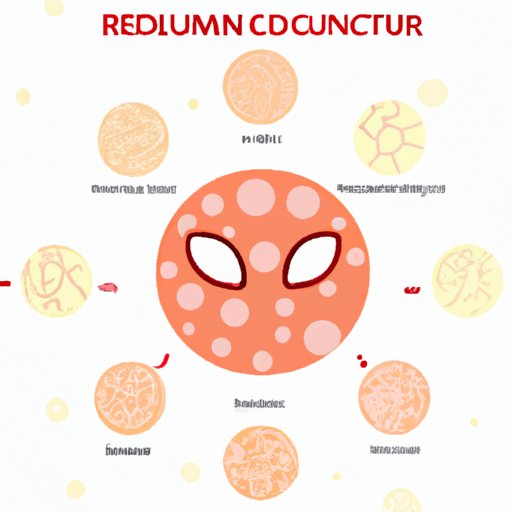Introduction
Having dry skin can be uncomfortable and frustrating, but did you know it can also lead to other skin issues such as acne? While many people assume that oily skin is more prone to acne, dry skin can actually cause breakouts as well. In this article, we’ll explore the link between dry skin and acne and provide tips for treating and managing both conditions.
Definition of Dry Skin and Acne
Dry skin is a common skin condition caused by a lack of moisture in the outer layer of the skin. It can cause itching, flaking, and red patches on the skin. Dry skin can be caused by a variety of factors including harsh weather conditions, certain medications, and hormonal changes.
Acne is a skin condition characterized by whiteheads, blackheads, and inflamed bumps on the skin. It is caused by clogged pores, bacteria, and excess oil production. Acne can be caused by hormonal changes, certain medications, stress, and genetics.
Overview of the Link Between Dry Skin and Acne
When your skin is dry, it can become irritated and inflamed. This can cause the skin to produce more oil, which can lead to clogged pores and breakouts. Additionally, when your skin is dry, it can be more vulnerable to bacteria and other irritants that can cause acne.
In some cases, dry skin can be mistaken for acne. The irritation and redness associated with dry skin can make it look like you have a breakout when you don’t. This is why it’s important to understand the difference between dry skin and acne.

How to Treat Dry Skin and Minimize Acne Breakouts
The key to treating dry skin and minimizing acne breakouts is to keep the skin hydrated and nourished. Here are some tips for doing just that:
- Use non-comedogenic moisturizers: Look for moisturizers that are labeled “non-comedogenic” or “oil-free,” as these won’t clog your pores and lead to breakouts.
- Avoid harsh cleansers or exfoliants: Harsh cleansers or exfoliants can strip away natural oils from the skin and make dry skin worse. Use gentle cleansers and exfoliants instead.
- Cleanse twice daily: Cleanse your face twice daily to remove dirt, oil, and bacteria that can lead to acne.
- Use a humidifier: Humidifiers add moisture back into the air, which can help keep your skin hydrated.

Causes of Dry Skin That May Lead to Acne
There are a few common causes of dry skin that may lead to acne. These include:
- Harsh weather conditions: Cold, dry winter weather can cause your skin to become dry and irritated, which can lead to acne.
- Hormonal changes: Hormonal fluctuations during puberty, pregnancy, and menopause can cause your skin to become dry and lead to breakouts.
- Certain medications: Certain medications such as acne treatments, corticosteroids, and antihistamines can cause your skin to become dry and lead to breakouts.
- Skin diseases: Skin conditions such as eczema and psoriasis can cause your skin to become dry and irritated, leading to breakouts.

Identifying the Signs of Acne From Dry Skin
If your dry skin is causing acne, there are a few telltale signs to look out for. These include:
- Inflammation: Inflammation is one of the first signs of acne. If your skin is inflamed, it could be a sign of an underlying infection or hormonal imbalance.
- Redness: Redness is another common sign of acne. If your skin is red and inflamed, it could be a sign of an underlying infection or hormonal imbalance.
- Whiteheads and blackheads: Whiteheads and blackheads are a sign of clogged pores. If you have these on your skin, it could be a sign of an underlying infection or hormonal imbalance.
Natural Remedies for Treating Dry Skin and Acne
If you’re looking for natural remedies to treat your dry skin and acne, there are a few you can try. These include:
- Tea tree oil: Tea tree oil has anti-inflammatory and antibacterial properties that can help reduce inflammation and kill bacteria that can cause acne.
- Honey masks: Honey is a natural humectant, meaning it helps keep your skin hydrated. Applying a honey mask to your skin can help keep it hydrated and reduce inflammation.
- Aloe vera: Aloe vera has antibacterial and anti-inflammatory properties that can help reduce inflammation and kill bacteria that can cause acne.

The Benefits of Moisturizing for Preventing Acne
Moisturizing your skin is one of the best ways to prevent acne. Moisturizing helps keep your skin hydrated, which can help reduce inflammation and prevent further breakouts. Additionally, moisturizers can help protect your skin from environmental pollutants that can cause acne.
Moisturizers also help keep your skin looking healthy and glowing. When your skin is properly hydrated, it looks more radiant and youthful.
Tips for Managing Acne in People With Dry Skin
If you have dry skin and acne, there are a few tips you can follow to help manage your condition:
- Avoid wearing makeup: Makeup can clog your pores and make acne worse. Whenever possible, avoid wearing makeup.
- Change pillowcases regularly: Pillowcases can collect dirt, oil, and bacteria that can lead to breakouts. Change your pillowcases at least once a week.
- Use oil-free sunscreens: Sunscreen is important for protecting your skin from UV damage, but some sunscreens can clog your pores and make acne worse. Look for oil-free sunscreens that won’t clog your pores.
- Avoid touching your face: Your hands can carry dirt, oil, and bacteria that can lead to breakouts. Avoid touching your face as much as possible.
Conclusion
Dry skin can cause a variety of skin issues including acne. It’s important to keep your skin hydrated to prevent dry skin and minimize acne breakouts. Additionally, there are several natural remedies you can use to treat dry skin and acne. By following the tips above, you can keep your skin healthy and free from breakouts.


